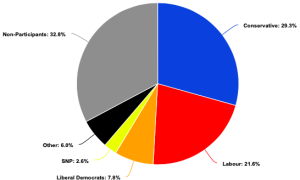“The will of the British Public” has become a phrase used often enough by politicians and public figures alike, particularly in the past couple of weeks – Boris Johnson insisting the public weren’t interested in ‘Partygate’; Kier Stammer saying the public want Johnson to go and countless others claiming the same idea that they know what the British people want. But do they really?
I can’t imagine that anyone from Parliament has discussed issues of the day in any depth with all 68 million subjects of the United Kingdom – if it were the case, they would have had very little time for anything else. So upon what do politicians base their interpretation of the will of the public? Well, the result of a General Election of course. Johnson in particular has pointed to his so-called ‘overwhelming mandate’ from 2019 as prime argument for the supposed approval of his administration.
I don’t know about you, but I don’t buy that, if not for the reasons previously mentioned then certainly because the electorate wasn’t given a chance to voice their true opinion in a nearly three-year-old election fought almost exclusively on a single issue and won largely due to the incompetence of the opposition.
However, let’s take Johnson and others at their word and assume the choices presented to the electorate were what they wanted. They weren’t, but the current governing class doesn’t care about that so lets just for a moment do the same and examine this so-called ‘mandate’.
Starting with the actual numbers the result of the 2019 General Election was as follows:
Conservatives – 365 Seats
Labour – 202 Seats
SNP – 48 Seats
Liberal Democrats – 11 Seats
Other Parties – 24 Seats
By all accounts a resounding majority and Boris Johnson wouldn’t have been wrong to take this result as a clear indication of the British public’s desire for Conservative rule. Yet as I’m sure many of us are aware this isn’t the whole story, so just for the benefit of those who aren’t aware there is another key piece of data to factor in. As in 2019 the number of votes for each political party were as follows:
Conservatives – 13,966,454 (43.63%)
Labour – 10,269,051 (32.08%)
Liberal Democrats – 3,696,419 (11.55%)
SNP – 1,242,380 (3.88%)
Other Parties – 2,839,806 (5.96%)
You’ll notice how different that so called ‘mandate’ now looks. Johnson’s claim to legitimacy is actually based on a minority, with more than half the electorate having voted for someone else, not to mention the disproportionate amount of power given to the SNP despite having received less votes than the Liberal Democrats. This shouldn’t be taken as an indictment of First-Past-the-Post voting, there are enough criticisms of that as it is; this is about the very legitimacy upon which Britain’s democracy rests. For there is one more figure we must consider – that is only given a passing mention by the majority of political commentators – but is in my view more important than any other, as it measures the health of our democracy.
In the 2019 General Election the Turnout Rate was:
32,014,110 out of 47,587,254 (67.52%)
This is relevant as not only does it give us a clear picture of the general public’s faith in our democratic institutions but, taken with the results of the past elections, we can see how much of the population our politicians actually represent. Using the following formula…
No. of Votes for Candidate
______________________ x 100 = % Representation
Size of Electorate
… this is how much of the electorate each political party actually represents:

This chart shows the actual voting behaviour of the United Kingdom as of the 2019 General Election. This breakdown is very different to the usual illustrations presented in the media, as it includes a large grey section that shows how many people chose not to vote at all in 2019. This statistic is usually omitted from the mainstream political commentaries as its usually dismissed as irrelevant, but it is also done for the more obvious reason that more people chose not to vote than supported the ruling government. The Conservatives’ claim to power is based on the support of not even a third of the electorate, whilst labour can barely garner a quarter. And it’s not just at the national level; here is a short list of the UK’s major political figures and how much of their individual constituencies they represent:

As you can see, not one of them can claim to represent a majority, that being over 50% of their constituents with people having voted for some one else or not at all. Poor Ed Miliband couldn’t even get a quarter of his constituents to support him and yet he currently holds a Shadow Cabinet post, legislating for the entire nation. Out of 650 MP’s in the House of Commons only five can be said to be truly legitimate in being supported by a majority of their constituents:

It’s of course by no coincidence that these five MP’s are all in the Liverpool Metropolitan Area – it’s Labour heartland, a politically active city and a very densely populated area. So, while there are some unique factors at play in their constituencies these are the only MP’s who can truly claim to represent the will of the British Public, which is ultimately what matters.
If we hold true to the idea that our system of government is to craft legislation that benefits the majority of its citizens then our legislators should at the very least reflect that too. To win more than 50% of your constituents’ votes isn’t hard – these five MP’s achieved it so why can’t others, especially with there being a massive portion of the electorate across the country that hasn’t yet participated.
However, this is the heart of the problem – current Parliamentarians don’t care about maintaining the interest of the electorate, as they believe it’s their fault for not voting in the first place, which is true. Except, such an argument is designed to have us compromise our principles by voting for someone we wouldn’t otherwise wish to see in power. But because we want to continue living in a democracy, we vote for them regardless which exacerbates the problem. Therefore, in such a situation what can one do but switch off to it all and become a nonparticipant?
I’m just as guilty of that apathetic outlook for I have never once voted in my life. This isn’t because I’m disillusioned with democracy – on contrary, as you’ve read here, I’m passionately committed to its defence. I want to ensure our representatives are beyond reproach when it comes to questions of legitimacy, and to also make available candidates that are worthy of your vote and mine. Make no mistake there isn’t anything broken about our democratic system, it’s working just as it was designed to nearly 300 years ago. What’s changed are the people using it, or much rather not using it, who wish to have the will of the people truly represented in our government and not manipulated by electoral systems or political degradation.
Boris Johnson will leave office; he will be replaced and the 650 MPs will return to their normal pre-covid routine, but what I hope we have learned in the past few weeks is how fragile democracy can be. Yes, scholars and commentators have illustrated the threats to democracy countless times before – but to see a man blow through all democratic checks, to see corruption and deceit spread across all high offices, to see the chaos unfold before your eyes – is another education entirely.
While Johnson or Starmer or Sunak may feel comfortable ruling out of a minority, they would do well to remember that other more insidious ideologies would be happy doing the same. The British people and their democratic spirit will always be the greatest safeguard against any demagogue or fascist but, if the system should work against them, it will fall prey to undemocratic and radical forces without the majority of people ever having supported them.
At the moment we can do very little, for the system remains unimproved, but I would ask you to wait, wait for the moment when the status-quo of Westminster is shattered. Then we must take the opportunity to reshape our democracy for the better, for if we do not then rest assured other more darker forces will.
William Kelly is a political writer and founder of www.agorawales.com



